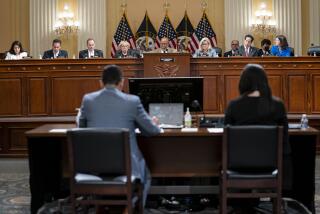President vs. Congress Ideal Campaign Move
- Share via
WASHINGTON — Bush is back. No, not from another foreign trip--he’s back in campaign fighting form, sharper than he’s been since he turned the tables on Dan Rather in the famous 1988 ambush interview. Only this time he’s simultaneously turning the tables on Patrick J. Buchanan in New Hampshire and the Democrats who control the Congress. Politically speaking, it’s a deft one-two punch combination that has gotten him off the ropes.
It started with the State of the Union address. Expectations had soared out of control before the speech, hyped in part by the White House staff and eagerly turned by the media into a high-stakes performance. George Bush rose to the occasion beautifully, with a patriotic challenge to a chastened Congress. He showed the same determination to fight the recession that he displayed with the Gulf War, echoing the line “This will not stand”--which became his first and final warning to Saddam Hussein. Just as in the Gulf War, he set a deadline--March 20--for congressional action, warning he would lead a political juggernaut against the Democratic Congress thereafter.
This was not the same friendly forum he had for his last major political speech at the 1988 Republican convention. The majority of his audience were Democratic senators and representatives who sat on their hands for most of the address. But Bush delivered his lines with conviction for 55 minutes, while laying out a detailed program that sounds like a political platform.
National polls show the speech didn’t have much staying power, but those aren’t the polls to use in gauging Bush’s State of the Union success. The polls that matter right now are in New Hampshire, where Buchanan’s challenge poses the next potential crisis for the Bush reelection team.
Those polls show Bush has steadily gained ground with GOP voters since the speech, rising from 52% in late January to 63% now. Bush is gaining at twice the rate of Buchanan, drawing votes not only from previously undecided voters but away from Buchanan as well.
Bush’s growing strength and impending rout of the Buchanan challenge has Pat playing defense. His attack commercials have been scuttled in favor of new ads outlining what Buchanan would do as President. With Buchanan’s sting removed, his barbs will degenerate into a mild background buzz as the campaign moves south for the March 10 Super Tuesday contest. That’s conveniently close to Bush’s March 20 deadline to Congress, freeing him up to mount his offense against the Democrats. It’s a flanking move that could have been lifted straight from the playbook of Stormin’ Norman Schwarzkopf.
Colorado Gov. Roy Romer, a Democrat, discovered Bush’s newly rediscovered political fighting skills when he tried to ambush the President at the White House last week. Bush returned fire by challenging Romer for specifics on how to get more money from the defense budget. The outspoken governor became mute. If Lyndon B. Johnson were still alive, he’d probably wish he had handled Eartha Kitt as forcefully when she protested his handling of the Vietnam War at a White House ceremony, instead of turning the FBI loose on her afterward.
Bush’s strengthened grip on the Granite State is a strong contrast to Democratic disarray. With Arkansas Gov. Bill Clinton having to defend both his marriage vows and his draft deferment, New Hampshire may not produce a strong front-runner after all. Instead of poring over the Plum Book of government appointments, Democratic insiders are back to pondering whether there’s an electable candidate in their ranks. There’s no better proof of the success of Bush’s new offensive than the growing speculation that someone else more electable than the current batch of Democratic candidates needs to step into the race. When the Democrats themselves think they’re in trouble, it’s a good bet it’s true.
The smart thing for the Democrats to do now is to cancel the congressional recess, forge a bipartisan economic recovery package and send it to the President before March 20. With more voters blaming Congress than the President for the recession, that’s the only way to keep from becoming a whipping post next month. It means handing Bush one more victory, but it might save some Democratic incumbents their jobs come November. At this rate, holding their own in Congress might be the best Democrats can accomplish in 1992.
More to Read
Get the L.A. Times Politics newsletter
Deeply reported insights into legislation, politics and policy from Sacramento, Washington and beyond. In your inbox three times per week.
You may occasionally receive promotional content from the Los Angeles Times.










